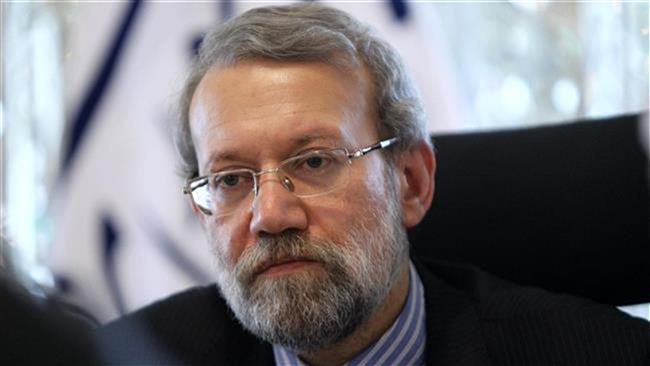Iran’s Parliament (Majlis) Speaker Ali Larijani says US President Barack Obama cannot make any “wise” decision on the Islamic Republic’s nuclear file due to his “weakness” as well as the domestic problems he is grappling with.
Larijani slammed Obama for seeking to get concessions from Iran by putting pressure on the Islamic Republic in Tehran’s nuclear talks with the P5+1 group of world power – Russia, China, France, Britain, the US and Germany – over its peaceful nuclear program.
Obama’s “weakness” and “domestic challenges” prevent him from making a “wise” decision on Iran’s nuclear work despite the “logical flexibility” shown by the Islamic Republic in the course of the nuclear discussions, added the top Iranian parliamentarian.
The US president wants Iran to give into irrelevant demands or the negotiations to fail, said the top Iranian lawmaker, adding, “Obama imagines he can impose the cost of his weaknesses in dealing with domestic issues on the Iranian side.”
Obama should come to the understanding that the Iranian nation will never give in and that his “erroneous polices” would be to blame if the nuclear negotiations fail to yield result, Larijani added.
Iran and the P5+1 have been holding talks to secure a final comprehensive deal over Iranian nuclear work.
Since an interim deal was agreed in the Swiss city of Geneva in November 2013, the negotiating sides have missed two self-imposed deadlines to ink a final agreement.
Iran and the P5+1 countries now seek to reach a high-level political agreement by March 1 and to confirm the full technical details of the accord by July 1.
Iran ready to set up regional nuclear safety pact, says Salehi
 Meanwhile, Head of the Atomic Energy Organization of Iran (AEOI) Ali Akbar Salehi says the Islamic Republic is prepared to establish a regional nuclear safety convention.
Meanwhile, Head of the Atomic Energy Organization of Iran (AEOI) Ali Akbar Salehi says the Islamic Republic is prepared to establish a regional nuclear safety convention.
Salehi made the remarks on Saturday after inking a memorandum of understanding (MOU) with Iranian Vice President and Head of the Department of Environment Massoumeh Ebtekar with the aim of bolstering cooperation on environmental issues.
Given certain Arab Gulf states are now engaged in peaceful nuclear activities, Iran is prepared to establish a regional safety convention monitoring the nuclear facilities in the region, Salehi added.
The AEOI chief further pointed to the MOU with Iran’s Department of Environment, saying the two organizations have agreed to broaden their cooperation on efforts to protect the environment against the negative impacts of radiation and nuclear activities.
Ebtekar, in turn, said the new MOU shows that Iran’s peaceful nuclear work is compatible with environmental standards.
“We have a national strategy to develop nuclear technologies,” Ebtekar said, stressing, however, that the country’s nuclear activities must live up to strict environmental principles aimed at preventing air, water and soil pollution.
PRESS T.V
R.S

